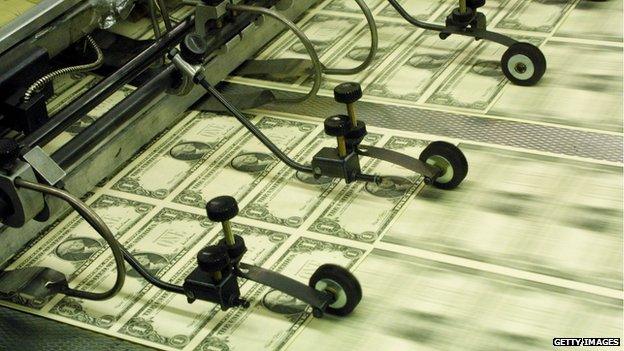Could the US default over just $6bn?
- Published
- comments

It doesn't seem like a lot of money for the government of the largest economy in the world. But, if the current talks don't come to a resolution and the US doesn't come up with that amount on 31 October, then it can't pay the $6bn (£3.8bn) of interest that is due on government debt.
In other words, the answer is 'yes' and the US would default on a debt payment. And the ramifications would be simply dire.
This is if the US Congress doesn't raise the so-called debt ceiling, which I have written about before.
The debt ceiling is a limit on how much the US can borrow. The problem is, now it is preventing the US from borrowing to pay interest on money that it has already borrowed.
US Treasury Secretary Jack Lew has said that the money runs out on 17 October. With the government shutdown, it may have bought a little time.
When it comes down to it, the US could not pay salaries and other bills. But, if it doesn't pay its creditors, then it would technically default.
Deja vu?
Almost the same scenario happened before, in 1979.
During the Carter administration, Congress also wrangled with the President over the debt ceiling. The result was that they came to an agreement at the last minute.
But, the government couldn't write the cheques fast enough (remember those), so there was a delay in paying around $122m in interest to bondholders.
The bondholders eventually were paid with back interest. But, the estimated impact was to raise the cost of US borrowing by 0.6% or 60 basis points (1 basis point is equal to 0.01%).
Academic research estimates that it contributed to high interest rates in the US during the early 1980s. Of course, rampant inflation during the 1970s also did.
That was a long time ago.
US short-term debt is now viewed as pretty much risk-free with investors demanding yields of just a few basis points to lend to the US government.
But, the immediate reaction to what looked like a technical default — literally speaking in the 1979 case — was for investors to become worried and demand more to lend to the US.
Now, investors are again worried.
The Hong Kong stock exchange has started to treat very short-term US debt, what's called Treasury bills or T-bills for short, as if they were no longer risk-free.
Some of the largest banks are beginning to do the same as they refrain from relying on T-bills as collateral for their transactions.
Even if the debt ceiling is lifted for six weeks as currently being discussed, investors are worried enough that they are also looking to exclude T-bills due to be paid in November and December.
Why it matters
Although this sounds pretty removed from you and me, the actions of these "market makers" matter.
By determining how much they would charge to lend to the US government, they help set the market rate for mortgages and business loans.
And in turn the US affects the world's capital markets because it has the largest so-called wholesale money market that banks and others rely on for financing.
Backing up a bit, investors that I have spoken to don't think that the US would default like Argentina did, where they just don't get paid or are paid a fraction after years of negotiating.
But, they worry about a lack of liquidity, which when translated means a lack of issuance of short-term debt by the US because the debt ceiling prevents the government from doing so.
The result for markets is that they would rather not rely on what they thought were highly tradable and "liquid" debt when it may not be due to prolonged political wrangling.
This is why yields or the amount that the US government has to pay to borrow rises because demand drops for these T-bills, with knock-on repercussions for all of us.
Coming back to the $6bn that is due on 31 October. It doesn't sound like a lot since the US produces about $43bn in output every day.
But, if the US misses a payment, then it would be considered a technical default because bondholders who are owed money don't get paid when they expect to. Even if that seems a bit technical and the US isn't Argentina, there are fairly notable consequences as I've described.
Plus, if the debt ceiling causes a loss of confidence in the US being the issuer of risk-free debt and that begins to weigh on the US dollar as the world's reserve currency, it would certainly be worrying if investors are unsure about whether the dollar will be a stable store of value.
The US dollar as the main currency used in international business is one of the reasons that the US has been able to borrow so cheaply.
Once creditors including the biggest holders of US debt like China and Japan begin to question it, it would be truly dire for America if it loses that "exorbitant privilege", coined by the former French Finance Minister Valery Giscard d'Estain, that has allowed it to enjoy low borrowing costs despite high levels of debt.
A prolonged political dispute would have lasting economic consequences as a result.